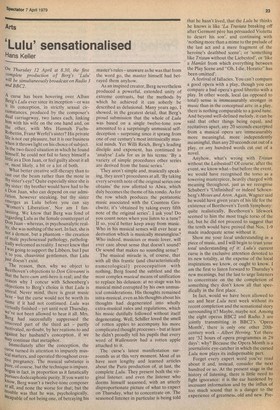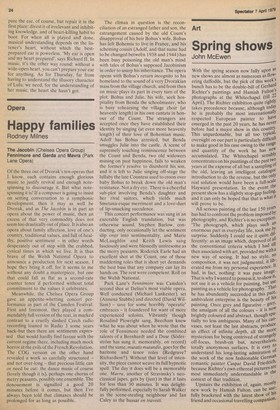'Lulu' sensationalised
Hans Keller
Ori Thursday 12 April at 8.30, the first complete production of Berg's 'Lulu' )vill be simultaneously broadcast on Radio 3 and BBC2.
A curse has been hovering over Alban erg's Lulu ever since its inception — or was rt its conception, in strictly sexual circumstances, produced by the composer's dual carriageway, two lanes each, linking him with his wife on the one hand and, on the other, with Mrs Hannah FuchsRobettin, Franz Werfel's sister? His private life is not our pleasure, but it is our business When it throws light on his choice of subject. In the two-faced situation in which he found himself, he could not fail to fancy himself a little as a Don Juan, or feel guilty about it all or, most likely, a bit or a lot of both. What better creative self-therapy than to cast out the beam rather than the mote in thy sister's eye? Quite especially since she is thy sister: thy brother would have had to be a Don Juan, who can depend on our admiration, however sneaking, but thy sister emerges as Lulu before you can say `Women's Liberation'. Nor am I fantasising. We know that Berg was fond of regarding Lulu as the female counterpart of Don Juan — whereas, in psychoanalytic reality, she was nothing of the sort. In fact, she is not a demon, but a phantom — the creation ?I male psychosexual pathology, pathologically welcomed as reality. I never knew that !Was going to support the Libbers, but I put It to you, chauvinist gentlemen, that Lulu Just doesn't exist.
The reason, then, why we object to Beethoven's objections to Don Giovanni is that the hero cum anti-hero is real; and the reason why I concur with Schoenberg's Objections to Berg's choice is that Lulu is Unreal. Never mind, there is great music here — but the curse would not be worth its name if it had not continued. Lulu was virtually finished — yet until next Thursday, We've not been allowed to hear it all. Mrs. Berg had successfully suppressed the unseored part of the third act — partly Motivated, no-doubt, by her reations to and against her husband's conception, if we may continue that metaphor. Immediately after the conception, the Furse turned its attention to impurely musical matters, and operated throughout creative pregnancy. The musical substance is Pure, of course, but the technique is impure, uogus in fact, in proportion as it fanatically Pursues dodecaphonic purity. If you want to know, Berg wasn't a twelve-tone composer at all, and none the worse for that; but the !rouble was that he was, psychologically. Incapable of not being one, of betraying his master's rules— unaware as he was that from the word go, the master himself had betrayed them anyhow.
As an inspired creator. Berg nevertheless produced a powerful, extended unity of extreme contrasts, but the methods by which he achieved it can soberly be described as delusional. Many years ago, I showed, in the greatest detail, that Berg's proud submission that the whole of Lulu was based on a single twelve-tone row amounted to a surprisingly unmusical selfdeception — surprising since it sprang from one of our century's most intrinsically musical minds. Yet Willi Reich, Berg's leading disciple and exponent, has continued to 'analyse' Lulu for us in his terms: `By a variety of simple procedures other series are derived from the basic series.'
They aren't simple and, musically speaking, they aren't procedures at all. 'By taking every seventh note of the original series one obtains' the row allotted to Alwa, which duly becomes the theme of his rondo. As for the row which produces the pentatonic music associated with the Countess Geschwitz, it's 'obtained by taking every fifth note of the original series'. I ask you! Do you count notes when you listen to a tune? If so, you'd better keep away from music. Who in his musical senses will ever hear a derivation which is musically meaningless? Who indeed, musician or music lover, will ever care about sense that doesn't sound? Or sound that makes no sounding sense?
The musical miracle is, of course, that with all this frantic (and characteristically numerological) preoccupation with nothing, Berg found the subtlest and the most complex musical means of unification to replace his delusion: at no stage was his musical mind corrupted by his own unmusical considerations. His thoughts remained intra-musical, even as his thoughts about his thoughts had degenerated into wholly extra-musical rules and regulations, which his music dutifully followed without itself degenerating. Well, Schiller loved the smell of rotten apples to accompany his more complicated thought processes but at least he didn't proudly tell his pupils that every word of Wallenstein had a rotten apple attached to it.
The curse's latest manifestation surrounds us at this very moment. Most of us have seen lengthy and learned articles about the Paris production of, at last, the complete Lulu. They present both the virginal listener, and even the listener who deems himself seasoned, with an utterly disproportionate picture of what to expect on Thursday, what to concentrate on. The seasoned listener in particular is being told that he hasn't lived, that the Lulu he thinks he knows is like `La Traviata breaking off after Germont pere has persuaded Violetta to desert his son', and continuing with 'nothing more than a mime to the prelude of the last act and a mere fragment of the heroine's deathbed scene'; or 'something like Tristan without the.Liebestod', or 'like a Hamlet from which everything between the Play Scene and "Oh. I die, Horatio" has been omitted'.
A festival of fallacies. You can't compare a good opera with a play, though you can compare a bad opera's good libretto with a play. In other words, local (as opposed to total) sense is immeasurably stronger in music than in the conceptual arts: in a play, there is nothing comparable to a good tune. And beyond well-defined melody, it can be said that other things being equal, and recitatives apart, any 20 seconds excerpted from a musical opera are immeasurably more meaningful, more independently meaningful, than any 20 seconds cut out of a play, or any hundred words cut out of a novel.
Anyhow, what's wrong with Tristan without the Leibestod? Of course, after the event, we know what —but before the event, we would have recognised the torso as a towering masterpiece, heavily charged with meaning throughout, just as we recognise Schubert's 'Unfinished' or indeed Schoenberg's Moses and Aron. Again, Wagner said he would have given years of his life for the existence of Beethoven's Tenth Symphony: quite realistically, Beethoven's lifework seemed to him the most tragic torso of the lot, but he did not proceed to suggest that the tenth would have proved that Nos. 1-9 made inadequate sense without it.
Show me your local understanding in a piece of music, and I will begin to trust your total understanding of it: Lulu's current curse is the exclusive attention devoted to its new totality, at the expense of the local inspirations we know, or ought to know. I am the first to listen forward to Thursday's new meanings, but the last to urge listeners to concentrate on the the completion of something they don't know all that specifically in the first place.
In fact, would we have been allowed to see and hear Lulu next week without its recent completion and the sensational story surrounding it? Maybe, maybe not. Among the eight operas BBC2 and Radio 3 are jointly transmitting in BBC2's 'Opera Month', there is only one other 20thcentury work — Albert Herring. Yet there are '32 hours of opera programmes in 29 days': why? Because the Opera Month is a journalistic eye-catcher in which the cursed Lulu now plays its indispensable part.
Forget every expert word you've read about it and, instead, consider the next hundred or so. At the present stage in the history of listening, there is little need to fight ignorance: it is the ear hardened by incessant information and by the influx of too much sound that is a danger to the experience of greatness, old and new. Pre pare the ear, of course, but repair it in the first place: divest it of irrelevant and inhibiting knowledge, and of heart-killing habit to boot. For when all is played and done, musical understanding depends on the listener's heart, without which the bestprepared ear is powerless. 'My ear is open and my heart prepared', says Richard II. In music, it's the other way round: without a wide-open heart, you can't prepare your ear for anything. As for Thursday, far from having to understand the illusory character of Lulu, we need, for the understanding of her music, the heart she hasn't got.



































 Previous page
Previous page